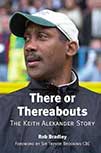 The Keith Alexander story
The Keith Alexander story
by Rob Bradley
Vertical Editions, £14.99
Reviewed by Ian Plenderleith
From WSC 312 February 2013
With Lincoln City perpetually languishing around the nether regions of the Conference, it’s tempting for wistful fans to recall more positive times at the club. These lie just a handful of years back when the Imps became a football trivia question for making the League Two play-offs five seasons in a row but failing to get promoted. This now seems like a bronzened era of relative glory.
When the late Keith Alexander began his second spell as manager at Sincil Bank in 2002, the crowds were as low and the money was as scarce as they’ve been throughout the past 30 years. But at least the team, as Alexander promised, would be “there or thereabouts” come the season’s end. Trawling the non-League bargain bins for big, tough lads who would do the proverbial job, the manager moulded Lincoln into a team that would not only survive but get results.
Lincoln’s inversion of tiki-taka won them few friends beyond the county boundaries but Alexander had already learned from his first year in charge at Lincoln in 1993 that playing neat football in England’s fourth tier garners faint praise, while losing you both games and your job. Sacked after just 12 months, the Football League’s first black manager dropped down to Ilkeston Town to relearn the basics of leadership. He returned to Lincoln as a man who knew how to get the best out of limited performers.
As a player, Alexander was a journeyman non-League striker who had the knack of making friends wherever he went, before moving on to try his luck somewhere else. He was a benevolent bender of rules, being fined by Barnet for turning out for a Sunday league team in Lincoln when he should have been resting and forging his birth certificate by two years at the age of 31 in order to secure a contract with Grimsby Town, his belated breakthrough as a player at League level.
The harshest criticism you will find of Alexander in this book is that he wasn’t much good in the air and that he could be tough with his players, as you would expect with any decent manager. You will read what you likely know – that he was a hard-working, genuine, funny and caring man who rarely forgot a name or a face and who would go out of his way to talk to fans and journalists without ever making them feel like it was an imposition.
Like its subject, this book is difficult to criticise. It’s written by another fine human being, Rob Bradley, the former Lincoln chairman who famously remortgaged his house to help save the club. It’s no great investigative work but it is a thorough and warmly told story with a sprinkling of wonderful anecdotes, such as the time when, playing for Cliftonville, Alexander smiled and blew kisses at bellicose Glentoran fans chanting racist abuse.
That kind of reaction is one of the reasons why family, friends, fans and fellow players universally remember a great bloke who, in the words of ex-Lincoln defender Ben Futcher, “was the only manager in football who could pull you into his office, tell you you’re not playing, and you came out with a smile on your face”.